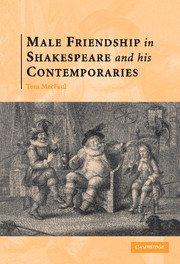Book contents
- Frontmatter
- Contents
- Acknowledgements
- Note on the text and list of abbreviations
- 1 True friends?
- 2 Momentary mutuality in Shakespeare's Sonnets
- 3 Friends and brothers
- 4 Love and friendship
- 5 Servants
- 6 Political friendship
- 7 Fellowship
- 8 False friendship and betrayal
- 9 Conclusion: ‘Time must friend or end’
- Notes
- Bibliography
- Index
6 - Political friendship
Published online by Cambridge University Press: 22 September 2009
- Frontmatter
- Contents
- Acknowledgements
- Note on the text and list of abbreviations
- 1 True friends?
- 2 Momentary mutuality in Shakespeare's Sonnets
- 3 Friends and brothers
- 4 Love and friendship
- 5 Servants
- 6 Political friendship
- 7 Fellowship
- 8 False friendship and betrayal
- 9 Conclusion: ‘Time must friend or end’
- Notes
- Bibliography
- Index
Summary
Whilst service necessarily involves social differences, there must always be a particularly acute, even categorical difference in a king's friendships, thus making ideal friendship impossible, but even attempts to act as the guarantor of friendship are shown to be equally futile in the history plays and in Macbeth. On the other hand, some plays, particularly the two parts of Henry IV and Hamlet, find different ways for the monarch to have symbiotic connections with friends, and thereby to realize his individuality and that of others. The word friend has what amounts to a specialized meaning in a political context – stripped of its affective component, it simply refers to allies and supporters. We must be wary, though, of taking this meaning as normative; rather, it is the affective meaning that is invoked, however distantly, whenever the word is used for political purposes in drama; the idea of an amity that binds the nation together is also never far away. The audience's reception of the word is split – part of us is sophisticated (or cynical) enough to recognize that political friendship is purely transactional, but there is a residual part of us which retains a naive or nostalgic sense that the core emotive meaning is or ought to be present. The monarch, Richard II for example, expects to be loved for himself, and expects that love to be the principle that holds the whole country together.
- Type
- Chapter
- Information
- Male Friendship in Shakespeare and his Contemporaries , pp. 116 - 140Publisher: Cambridge University PressPrint publication year: 2007



